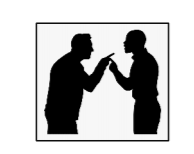| Al Yankovic is credited with saying, “If you want to avoid heated arguments, never discuss religion, politics, or whether the toilet paper roll should go over or under.” He is probably right about all three, but from what I am observing, he is certainly right about the first two. It is not uncommon to hear and read fiery discussions about religion and politics. Social media abounds with them. |
Social media abounds with them. May I be so bold as to suggest some guidelines for all of us to follow when discussing matters where we differ?
Proceed with caution. Knee-jerk reactions are dangerous. We don’t have to accept every invitation we receive to a fight. We don’t have to give “our two cents worth” on every issue, especially when we have little information about the matter. We must choose our battles thoughtfully. We must be careful about crying, “Wolf!” all the time. It causes a loss of credibility.
Check motives. Are we really searching for truth, or are our minds already made up and we don’t want to be confused with the facts? Is it about understanding a person’s viewpoint, or is it about winning an argument whatever the price? Will we even resort to humiliating a person if it means we win?
Investigate. Everything we hear or read isn’t true. Misinformation abounds. There really is “fake new.” It takes a little effort to fact check, but it is so important to do so. Davey Crocket said, “Be always sure you are right, then go ahead.” He was right.
Deal with positions, not personalities. Ad hominem is the strategy of attacking the character or motive of someone rather than dealing with their position. This is often done when a person has no answer for the information presented. It is easier to vilify a person than it is to deal with the position he/she holds. It is about what is right and not who is right.
Be honest. Sound bites abound. They are easy to spin. It is common to justify in one person what we would condemn in another. Discussing differences demands honesty. We must not twist facts to support our position. I remember a college professor reminding us that truth is truth no matter who tells it, and the same is true of error.
Be kind. Holding different views never gives us the right to be mean spirited. We must treat people right. The Golden Rule always applies. Remember it? It is not, “Whoever yells the loudest is right.” Rather it is, “Therefore, whatever you want men to do to you, do also to them, for this is the Law and the Prophets” (Matthew 7:12).
I do not discourage discussions about things on which we disagree. Rather, I encourage them. They can be productive. They can result is a better understanding of people and the positions they hold. I believe the simple guidelines listed above will serve us well when we discuss our differences.
Proceed with caution. Knee-jerk reactions are dangerous. We don’t have to accept every invitation we receive to a fight. We don’t have to give “our two cents worth” on every issue, especially when we have little information about the matter. We must choose our battles thoughtfully. We must be careful about crying, “Wolf!” all the time. It causes a loss of credibility.
Check motives. Are we really searching for truth, or are our minds already made up and we don’t want to be confused with the facts? Is it about understanding a person’s viewpoint, or is it about winning an argument whatever the price? Will we even resort to humiliating a person if it means we win?
Investigate. Everything we hear or read isn’t true. Misinformation abounds. There really is “fake new.” It takes a little effort to fact check, but it is so important to do so. Davey Crocket said, “Be always sure you are right, then go ahead.” He was right.
Deal with positions, not personalities. Ad hominem is the strategy of attacking the character or motive of someone rather than dealing with their position. This is often done when a person has no answer for the information presented. It is easier to vilify a person than it is to deal with the position he/she holds. It is about what is right and not who is right.
Be honest. Sound bites abound. They are easy to spin. It is common to justify in one person what we would condemn in another. Discussing differences demands honesty. We must not twist facts to support our position. I remember a college professor reminding us that truth is truth no matter who tells it, and the same is true of error.
Be kind. Holding different views never gives us the right to be mean spirited. We must treat people right. The Golden Rule always applies. Remember it? It is not, “Whoever yells the loudest is right.” Rather it is, “Therefore, whatever you want men to do to you, do also to them, for this is the Law and the Prophets” (Matthew 7:12).
I do not discourage discussions about things on which we disagree. Rather, I encourage them. They can be productive. They can result is a better understanding of people and the positions they hold. I believe the simple guidelines listed above will serve us well when we discuss our differences.

 RSS Feed
RSS Feed